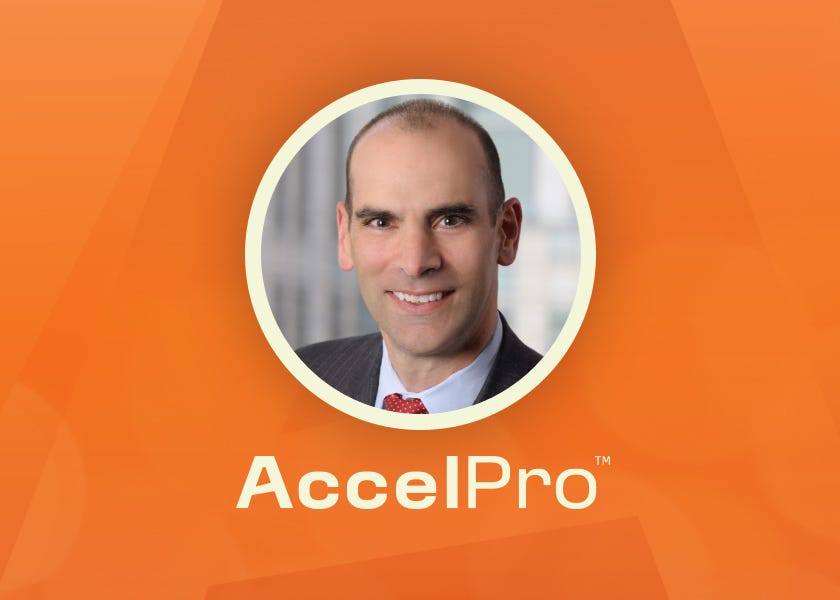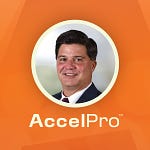Listen on Apple Podcasts, Spotify and YouTube.
Welcome to AccelPro IP Law, where we provide expert interviews and coaching to accelerate your professional development. Today we’re featuring a conversation with Jonas McDavit, Partner at Desmarais.
In this interview, we discuss the emotional elements of patent law and patent litigation; how patents are viewed differently by inventors and by lawyers; and the importance of a scientific background when working with patents from a legal standpoint.
We also discuss McDavit’s time in the Navy, and his transition from military service to the legal world.
Listen on Apple Podcasts, Spotify and YouTube.
Interview References:
Jonas McDavit’s Desmarais LLP profile and Law360 portfolio.
4:43 | US Patent and Trademark Office (USPTO). (2023).
Supplemental Materials:
Brittain, Blake. (August 16, 2022). Cisco beats back $371 mln patent lawsuit after Boston trial. Reuters.
Desmarais LLP Wins $371M Noninfringement Verdict for Cisco. Desmarais LLP.
TRANSCRIPT
I. PATENT LITIGATION LAW DISPUTES
Neal Ungerleider, Host: Jonas, can you tell us a bit about your day-to-day job responsibilities?
Jonas McDavit: I'm an intellectual property litigator. I have litigated technology driven disputes now for 15 years, and most of the area in which I practice is in the area of patent law.
If there is a company who either has a patent or is accused of infringing a patent and they get into some sort of dispute over that, it goes to district court normally. And what our firm does, and what I think we're particularly good at is presenting these types of cases in front of juries.
Ultimately, most of these patent litigation disputes - as opposed to other types of civil litigation - tend to go to jury trials more often than others. So that's what I do today, and that’s what I've done in my career. The way I got into this business and the way that litigators get into this business is, I think, different from what you see from a lot of other types of students who come through the ranks, and go to law school, and join large law firms.
I think every area of civil litigation probably has its own unique standpoints from one way or the other. But I think our area of the law tends to get people who have different types of backgrounds. Maybe that's the best way of describing it. Everyone I've practiced with has their own unique story.
This is a second career for me. I was in the United States Navy as a Submariner for about seven years before I went to law school. After I graduated college, I went right into the Navy. I went through training and was on a submarine for a little over three years. I then worked on a short command with the Navy SEALs. Then I went to law school. Then, from law school, I went to start practicing doing what I do now from basically a trainee and associate at a large law firm.
NU: We're going to get back to that transition from military service to law school later. But for right now, could tell us a little bit more about the two strains of thought that run through the background of patent law disputes.
JM: So one thing that we do as litigators is that we steal from each other. I'm liberally stealing from colleagues of mine when we talk about these issues. I don't want to give anyone the misimpression that these are all original thoughts. We plagiarize liberally when it comes to sharing ideas about how to try cases, and about patent law.
But I do think a good analogy is that there are essentially two different strains of thought, like you said, that go through patent law. One is concentrating on the words that are on a United States patent.
A United States patent is issued by a government agency called the Patent Office. A patent usually has three parts. There's a series of pictures and there's a written description which is supposed to elucidate what those pictures show. Then there's the property - which are called the claims - which are numbered paragraphs at the end of the patent. That's actually what you're protecting.
What is enforceable? What is the piece of property that you own? Very much like when you have a deed to your property at your home, it is defined by a red stake at some latitude and longitude. There's a bush somewhere. There's an old stone stove in your backyard, and the remnants of that foundation are the other defining point on your lot.
That's how, when you go to court and you're trying to decide if someone is trespassing on your land, that's actually what you do. You bring your deed and you say, “I have a lot that's defined by a certain stake in a certain place. You happen to be there, and therefore you're trespassing.”
If I want to collect some kind of money damages for the amount of trespass that has occurred, or the length of time? That's how it's judged when you go to court, and very similarly that's what you do with patent claims. You have a claim, it has words, and you try to prove that whatever is happening, whether it's a product that's being made, does what your words say. It fits within the confines of your claim.
Then you're compensated based on the amount of damage that has been done to your property based on your trespass. It's the same concept. That's a very formal, legalistic way of thinking about patents.
If anyone is so insane as to want to go read a bunch of patent decisions put out in courts, that's what they're going to be talking about. They're going to be looking at the words on the page, and they're going to get very technical. They're going to say “This is what this product does. This is what this claim says. These are what the words mean.”
They're going to try to do the same analysis that you would do as if you had a piece of real property. If you think about property in the law, a patent is just a deed just like you would have for your property that you own.
But there's another good analogy if you think about what your home is, and what an invention is. So, ultimately a patent–your claims are supposed to be surrounding an invention. The invention that you come up with is supposed to be some kind of improvement over what has come before. It is what is written down on the page, but it's something that can't be necessarily reduced to writing.
If you think about it, if you're trying to define what your home is, is it just the property that you own? And if it's something more than that or it's something less than that. It could be your hometown–you have a connection to it. Or your home county, or your home state. There's a certain connection to it. But then again, it's not necessarily limited to the property that you owned, because it has to do with the people that live there. The pictures and videos that you've taken over time. Things that you care about because you collected your stamp collection that you have in your basement. Those are things that make up your home. That is something that's different than just the deed that you own. If you get to a high enough level of abstraction, especially when you look at Supreme Court decisions–or if you just think about how we as litigators want to talk to a jury. That emotion and that connection has to come through, where you're protecting not just the words on a page and a deed on a property. There's something about it that is emotional; that is a connection between you and an invention that is better expressed as like your home versus just protecting a piece of property.
Very rarely does the Supreme Court take patent law cases. But when it does, that's the way I think normal people think about patents. They think about, “Well, you're protecting an invention. You're protecting your home.” There's some, something that is beyond just the four corners of whatever the claims say. So those are the two basic strains that run through patent law.
The way you define whether someone infringes or not, or whether a patent is valid or not, is focused on the words on the page. It's focused on the deed. But when you're trying to convince someone there's a reason why this is something that's worth protecting, and you're trying to talk to a regular person about it– or you're trying to talk to a court, and you're trying to get them to understand why this is worth protecting. I think a lot of the decisions are infused with the idea that the invention is something more. You're protecting a home, not just the words on a page.
—
II. RECONCILING DIFFERENT VIEWS OF PATENTS
NU: Going further, is there a way to reconcile the way that patent holders and litigators view patents versus the way that juries, regulators, and policy makers view patents?
JM: When litigators get involved in a patent case, a lot of times what we're looking for is a story, and we're looking to build a story. It's sometimes talking to an engineer, and trying to get them to understand that it's not just the words on the page and the invention. There is a story behind it. I want to convey that emotion. Because when I try to convince a jury–you know, a regular person–why I should care about your invention or your product? I need to have that, and that's essential. I think people who are engineers are often trained in a way, and come up in a way where they're far too humble.
They're not used to saying, “This is great.” They just say, “Anybody would do this. I'm not all that special. Everything that I've done is just natural.”
That doesn't help tell a story, especially if you're trying to say, “Well, you have a patent on this. Why is this important?” You have to be able to express why this is something new and inventive, and is actually progressing the arts. With that comes that sort of emotional story as to why that invention means something. At the same time, you could have an inventor who sometimes thinks that what they've done is really special. But if you can't articulate that in a way that's going to motivate someone to understand why this is so important, sometimes they'll just say, “Well, here's the patent. Here's the dinner that I just served you. It's right there, it's all great.”
But I have to be able to convince someone that this really is special. So tell me why it matters. Because I don't see the fact that you've manufactured the semiconductor in a certain way makes a difference to a regular juror or regular judge. Tell me how that makes a difference. Does it make your iPhone faster, and does it take less time to charge it? How does this invention translate to something that's going to affect your life in the real world?
What we specialize in, and what I think makes our area of the law unique, is trying to unearth those types of discussions. And try to get people to sometimes express themselves in ways that they weren't expecting.
—
III. THE IMPORTANCE OF SCIENTIFIC BACKGROUND
NU: Earlier you mentioned patent litigators usually have different backgrounds than most other big law lawyers. So, you yourself, you are a nuclear engineer. Can you explain why having a scientific background can be helpful?
JM: Well, I think having a scientific background, say, 50 years ago–there was sort of a “guild mentality” that went along with this area of the law. Quite frankly, I think it was trying to protect this area of the law from others who said they could do it. That has kept the number of people who practice in the areas of patent litigation small. Because in order to demonstrate that you can play on this field, so to speak, you need to have a scientific background.
Lawyers, by training, tend to come from fields that do not draw people who have scientific backgrounds. Those people–quite frankly, who have dreams of being an engineer or a doctor or a scientist somewhere–do not dream of being lawyers. There's a sort of a natural selection that goes on with that.
That has changed over time, especially because the money that's involved in patent litigation has proven to be quite large and remunerative to many. There are more people that want to play in the space, and I think there are more people that know about our space. But I still think there is a natural inclination to keep and protect the field as enforced by the patent office rules; to keep it closed to people who have scientific backgrounds. I don't know that it's essential. I mean, I personally went through training through the Navy–but not academically. Because when I went to school, my major was called “government”. Which is a fancy way of saying “political science”, which is a very typical lawyer type major. But not a typical patent lawyer type major.
It gives people the confidence to engage in technical subject matter. When you have a scientific background, you've been challenged with something. Not that it's going to be right in your sweet spot, but you're going to have at least the ability to know where it is that you need more help. What kinds of books to look at, how to talk to engineers, and learn to meet them halfway and speak their language halfway.
I think it's great training to have an innate confidence in yourself to be able to engage with highly technical subject matter. I've litigated many patents over my career. I would say over the span of 15 years or so, I've never come across a patent that I've litigated that has to do with nuclear engineering.
I think that's the case for a lot of my colleagues–where they'll have a PhD, they'll have studied in a very specific area of whatever types of engineering. But that doesn't mean they're going to litigate a patent that falls within their sweet spot. It's certainly helpful, but I think it's helpful in different ways that people think.
NU: Do you have any advice for listeners who might be going on from military service to legal careers?
JM: I think the military does a great job in giving you a different kind of confidence. But the same thing that I was just talking about–that you've learned to manage people and manage yourself. And you've had that experience, and you've had challenges.
Law school is a different kind of challenge. Working for another job is a different kind of challenge. If you've served in the military, you have had experience in lots of different ways that people your age, who are going through law school at the same time as you, will not have had. That is something that is unique about yourself. I would lean into that.
Fewer and fewer people today have a background of military service. Now that we have an all volunteer military–and there's no mass drafts or anything like that–that's only going to increase in the future.
It's not so much that you have experience that would translate directly into the law necessarily. But it's experience that you have with life, how to manage people, and how to manage yourself. That is the type of thing that's invaluable. It gives you the kind of confidence to engage with the technical subject matter that we see in our field–that, you know, a lot of people just would be intimidated by, or just wouldn't know where to start. If you have a military background–and you got that experience at a young age–you're gonna have a leg up more than other people who are at the same level.
Listen on Apple Podcasts, Spotify and YouTube.
This AccelPro audio transcript has been edited and organized for clarity. This interview was recorded on May 5, 2023.
AccelPro’s interviews and products accelerate your professional development. Our mission is to improve your day-to-day job performance and make your career goals achievable.
Please send your comments and career questions to questions@joinaccelpro.com. You can also call us at 614-642-2235.
If your colleagues in any sector of the IP law field might be interested, please let them know about AccelPro. As our community grows, it grows more useful for its members.












